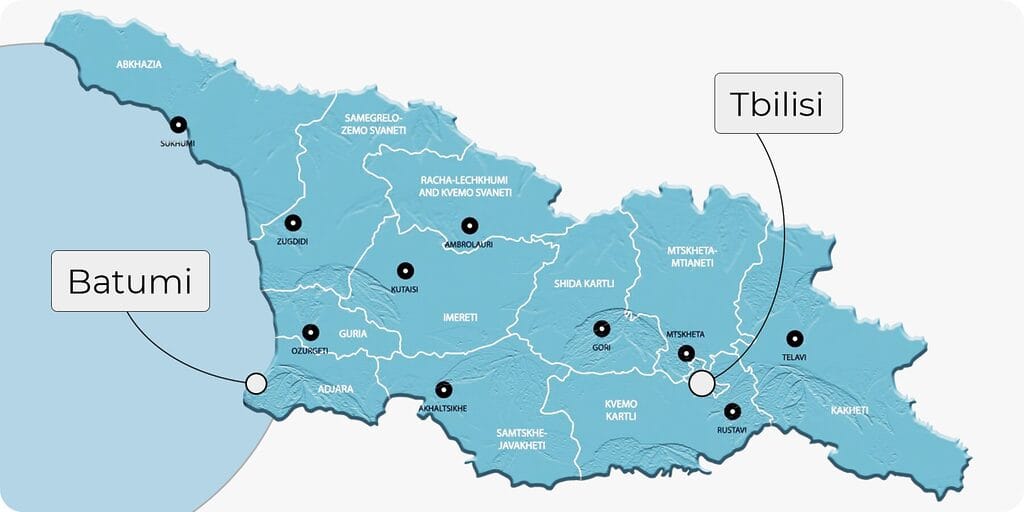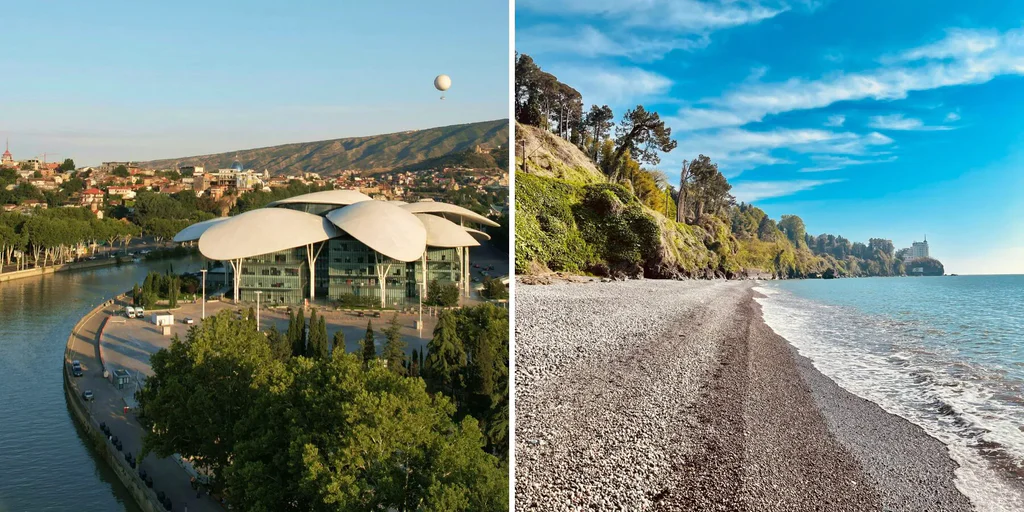According the National Statistics Office (GeoStat), 7 million people visited Georgia in 2024, 35.6% touching down in Tbilisi and 26.7% in Batumi, a differential that will generally hold true throughout this article. Both cities have their pros and cons, or course: We’ll let the numbers tell the tale.
A quick overview of Georgia’s two largest cities
- 1.3 million people, a third of the population, live in Georgia’s unapologetic political, cultural, and economic capital of Tbilisi. Generating half of the national GDP, Tbilisi lists slightly to starboard with trade, real estate (construction), and IT, according to GeoStat.
- 187,000 inhabitants make Batumi Georgia’s second most populous city. Located on the Black Sea coast, it is an important logistics hub and center for hospitality, manufacturing, retail, and real estate contributing 9.5% to GDP.

Property value
According to Global Property Guide, it cost an average of USD 500 to rent a one-room apartment in Tbilisi (50 m²) in August 2025. Prices on SS.ge tended to range between USD 400-800 depending on the neighborhood.
The average rental price in Batumi in August (peak tourist season) was USD 550, though offers could be found in the Agmashenebeli neighborhood for as low as USD 400. For the rest of the year, Batumi is cheaper than Tbilisi.
Prices begin to diverge in the cost of real estate for purchase. According to Global Property Guide, a square meter in Batumi will cost 5-10% less than in the capital, ceteris paribus, which, if you’re looking to buy an apartment for yourself, could be significant.
Investors may want to keep in mind that although the occupancy rate drops in Batumi after the tourist season, Galt & Taggart places the average annual yield in Batumi at 8.6 % (it’s 8.4% in Tbilisi).
Get free advice on the Georgian real estate market from the experts at PB Services.
Cost of living
The general consensus among popular travel websites like Numbeo, Living Cost, and Expatistan is that food, clothing, restaurants, sports, and transportation are all up to 30% cheaper in Batumi than in Tbilisi.
The WageIndicator Foundation bears this out, placing the monthly cost of living for a family in Tbilisi at GEL 3,400 (USD 1,260) and GEL 2,710 (USD 1,005) in Batumi.
This is partly due to geography. Batumi is only 30 km from the land border with Turkey, one of Georgia’s most important trading partners and the source of almost 15% of Georgia’s USD 2.78 billion in imports, and an hour’s drive from the city of Poti, the country’s largest seaport, which handles container shipments from the EU and US.
We wrote a separate article about how Georgia stacks up against the Eurozone in terms of basic goods and services. Spoiler: The difference in prices is significant!

Infrastructure
The International School of Economics at Tbilisi State University (ISET) painted a clear picture of the situation with infrastructure in March 2025, assigning Tbilisi a leading index of livability score of 0.71 and Batumi second place with 0.53 points.
The Asian Transport Observatory has noted that 28 km of metro line (with 23 stations) and an extensive road network ensure about half of the city’s population access (access defined as a distance of 500-1,000 meters from one’s home to the infrastructure in question) to transportation. Access to health services and schools is even higher at 70%, with access to public space at 74%.
So if you are looking for a high level of mobility and excitement, Tbilisi is your best choice. Lonely Planet has included Tbilisi in its top 15 culinary capitals, and local nightclubs (Bassiani in particular) are regulars atop global ratings. Check out our list of some of the city’s most interesting spots in this article.
That’s not say Batumi is out in the sticks. It is a major tourist center and boasts an enviable compactness. It is ten times smaller than Tbilisi, with plenty of public space within walking distance, and GeoStat estimates the Adjara region to be home to 5,000 km of roads, or 12% of the Georgian road network.
The pace of life in Batumi is naturally slower than in the capital and better suited to those looking to take it easy. To paraphrase the Internet: The sea soothes the mind, calms the soul, and restores the spirit.
Business environment
You’ll find Tbilisi at the top of remote work rankings. The Nomad List, for example, now ranks Tbilisi 11th, ahead of Barcelona, Tokyo, Seoul, and Buenos Aires, to name a few. And the British company Currys recognized Tbilisi as the best location for UK citizens to work remotely from in 2024.
Less known generally, Batumi doesn’t really show up in ratings like this, meaning many freelancers end up in Tbilisi by default. Consequently, the creative class (including IT) is much more widely represented in the capital, as are almost all venture funds and startups (we wrote about in a recent article).
But Batumi may be an interesting option for companies looking outwards. It’s just a stone’s throw to the Poti Free Industrial Zone, the country’s oldest, and the New Silk Road connecting Asia, Europe, and Africa hinges on the region.
Read more about industrial zones here. In addition to Poti, there are three FIZs in Georgia: two in Kutaisi and the newest one in Tbilisi. The lawyers at PB Services can help you prepare all the necessary documents to obtain status in one of these zones.
Overall convenience
A few other things to note before deciding to pull up roots and mosey on over to Georgia:
- Typical summer temperatures in Tbilisi can rise to 35 °C. In Batumi, they rarely exceed 29 °C, according to Weather Spark. Because of the sea (soothes the mind, calms the heat index…).
- Batumi is significantly more humid: exceeding the comfort zone 77% of the time (when the dew point exceeds 18 °C), something that happens in Tbilisi only 17% of the time. One consequence: mold. So keep that in mind when looking at properties.
- Air purity doesn’t vary greatly between the two cities. Both score 50 in the IQAir index, borderline between excellent and moderate for harmful particles, roughly the same as Oslo, New York, and Singapore and considerably better than top offenders Hanoi (168), Kampala (155), and Dubai (151).
- According to Numbeo, Batumi is a little safer, scoring 79.22 points to Tbilisi’s 74.62, though both cities are generally quite safe. Gallup’s Law and Order Index gives Georgia 86 points, the same as Germany, Japan, Ireland, and Hong Kong.
- In terms of Internet speed, SpeedTest gives Tbilisi 36.17 Mbps to Batumi’s 29.51.
- Knowledge of English. According to the Caucasus Research Resource Center, 51% of Georgians lacked any knowledge of English in 2024, with 20% possessing an elementary level, 16% B1, and 10% C1, improving slightly in Tbilisi, assigned a score of 556 points by the EF English Proficiency Index (Batumi scored 540).
- Quality of medicine is difficult to measure objectively, but Numbeo’s Health Care System Index assigned Batumi a 65/100 for overall competence and accuracy of diagnosis to Tbilisi’s 55.7.
***
Even when you focus strictly on the numbers, it’s hard to say straight up whether Tbilisi or Batumi is better: It really depends on what you’re looking for. One thing is for sure, though, wherever you are in Georgia as an expat, life has a lot to offer.
The same applies to legal services, available across the country, and the Georgian legislative system has worked hard to eliminate tedious bureaucracy. Still, if you need assistance with your documents, business registration, or real estate purchase, drop the specialists at PB Services a line with the form below.
